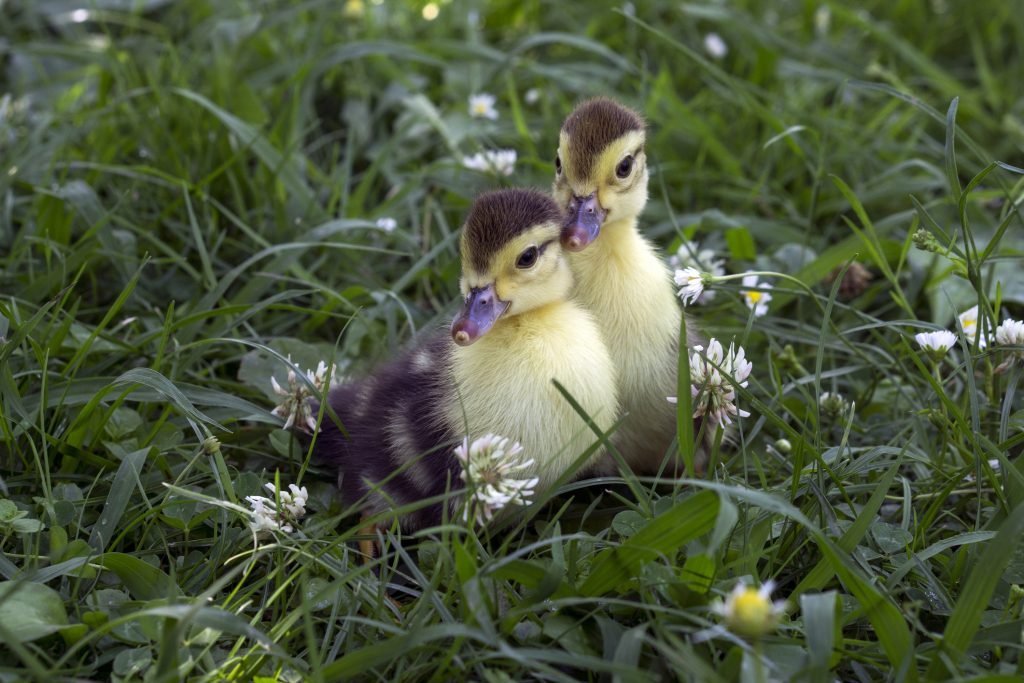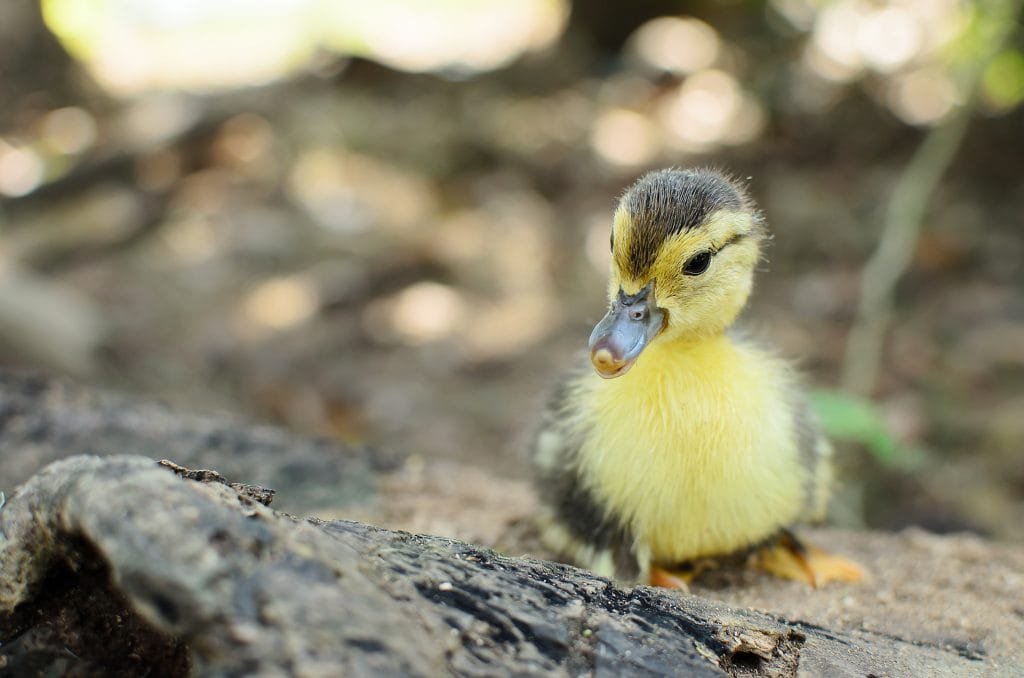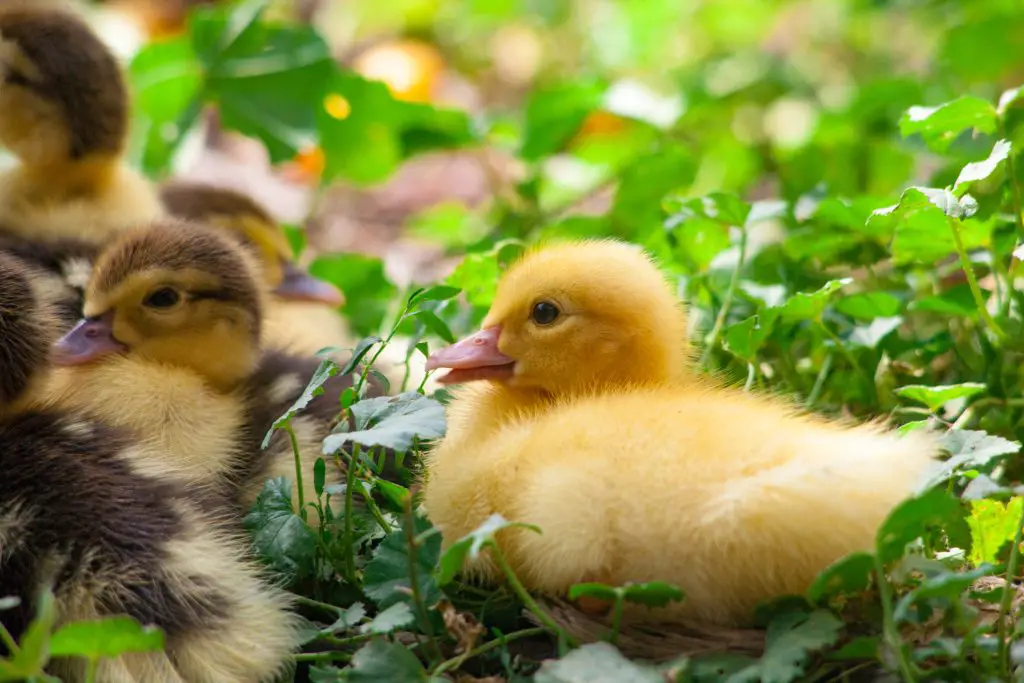This post contains affiliate links.
Ducklings are adorable creatures, and they are growing in popularity as more people become homesteaders and self-reliant. Ducklings can become nosy, though, and there are various reasons for this. So, why won’t your duckling stop quacking?
There are many reasons why your duckling may be quacking excessively, including that it may be trying to communicate with you, it may be scared, it may be lonely, your duckling may need something from you, it may be uncomfortable, or happy, to name a few reasons.
Should you be concerned when your duckling won’t stop quaking? Could the non-stop quaking be a sign that your duckling is sick? Let’s find out!

Why Do Ducklings Quack?
Ducks are gorgeous animals growing in popularity as many people are starting to move off-grid or become homesteaders.
Ducklings, in particular, are growing in popularity as most people want to raise their ducks in a certain way or even have them imprint on them to make their interaction with their ducks easier. Ducklings come with a higher level of responsibility than adult ducks, as they require more care and attention from their owners.
So, when your ducklings finally find their voice, and they begin quacking incessantly, this can be quite alarming to most duckling owners. This is understandable as they do go from being these quite little things to some of the noisiest creatures you will have in your life.
There are many reasons why your ducklings may be quaking more than they used to. Some of these reasons are a cause for concern, while others are natural, and you need to get used to them. Let’s go through them to find out what your ducklings are trying to say to you.
1. Your Duckling Is Trying To Communicate
When ducks quack, they try to communicate or talk with each other or you as their caregiver. Ducks are very social animals and do love communicating with others.
Ducks generally quack in the wild to communicate with each other, form friendships and bonds and grow their social circle, and they can start doing this from an early age.
Ducklings are like baby humans in this sense, as they will make a noise to try and communicate with you because they like you and feel safe with you. So, when your duckling looks up at you and begins to quack, sometimes non-stop, they could be trying to talk to you and bond with you to strengthen your relationship.
When this happens, the best thing to do is talk back to your duckling, to let them know that you are there, and you hear them, even though you don’t understand each other.
Another way ducks communicate is through wagging their tails, if your duckling is quaking and wagging its tail then it may be a sign of affection. Learn more in my article Does your Duck Wag its tail? 4 signs of affection.
2. Your Duckling May Be Sacred
In the wild, ducks also use their quacking to warn each other of possible dangers approaching them. Ducklings will also begin to quack when they feel threatened or sacred in their environment, especially if it’s a new environment.
Ducklings will quack to help warn the other ducklings of possible dangers, and they will quack in this situation to try and find where you are if they have imprinted on you or you are their safe space.
The cause of this can be something as simple as you leave the room, so the ducklings can no longer see you, and they feel unsafe and scared. Sometimes when the ducklings are scared, they may not stop quacking until you comfort them and help them calm down and feel safe.
If your duckling has imprinted on you or feels particularly safe with you, then you need to keep this duckling with you until it matures a bit more, or it will quack a lot.

3. You May Have A Female Duckling
With certain species of ducks, if your duckling is particularly loud compared to other ducklings of its type, then this could mean that your duckling is a female. With some duck breeds, the females are more vocal and louder than the males.
With these duck breeds, the male ducks will generally make more raspy sounds rather than a quack, and they will be a lot quieter than their female counterparts. Although you can find a male more vocal than others depending on their personality, it’s not highly likely.
The females will quack and call out to other ducks for various other reasons. With these duck breeds, the females will begin to vocalize more than the males when they are ducklings. So, there may not be anything amiss with your noisy duckling at all, and it’s just a female.
4. You Have A Vocal Duck Breed
There are duck breeds that are more vocal than others, including both the males and females of the species. There are some duck breeds that don’t even produce the famous quacking sound that we have all come to associate with ducks.
There are ducks in the world like the Mallard and the UK duck that will make the iconic duck quack, but others will squeak, croak, or whistle. There are even some ducks that will remain mute and won’t make any noise at all. Muscovy ducks tend to be some of the quietest while Call ducks are some of the loudest.
So, your duckling might be from a very vocal breed of duck that will quack whether they are male or female. However, the only way to know if your duck is a vocal species is to research your duckling’s breed. If you have a vocal duck breed, making noise is perfectly normal.
5. Your Duckling May Need Something
If your duckling goes through periods of quacking, and then they stop for a little while, only to start quacking like crazy again, then your duckling may need something from you. You need to remember that ducklings are like babies, and they will rely on you for everything they need to survive.
Your duckling will rely on you for water, food, shelter, safety, comfort, and if your duckling is alone, then it will depend on you for socialization too. You need to ensure that all your duckling’s needs are met, or they will begin to quack to try and alert you that they require something.
Often the duckling will not stop quacking, or they will quack intermittently when they need something. So, if this is happening, go and check on your duckling and ensure they have fresh, clean water and food, and maybe cuddle them.
- NO ANTIBIOTICS: Manna Pro Duck Starter grower is formulated with non-medicated, non...
- BALANCED NUTRITION: Complete feed formulated with balanced nutrition to support strong...
- DIGESTIVE HEALTH: Formulated with probiotics to support gut health and digestion
6. Your Duckling Is Trying To Grab Your Attention
If your duckling is the only duckling that you have, then your duckling could get lonely. As mentioned earlier, ducks are social animals and require companionship, either from you or other ducks.
So, if your duckling is your only one, and it’s quacking a lot, this could indicate that it is lonely and needs some attention from you. Learn how many ducks you should have in my article, How Many Ducks Should I Get? Things to Consider.
If you are the only companion for your duckling, then your duckling may quack at you to grab your attention and sometimes even to get approval from you for something they are doing. If this is the reason, you need to ensure you give your duckling all the attention they need to keep them happy in your care.
If your duckling does not receive this needed attention, the duckling will become lonely and will quack a lot more than normal.
7. Ducklings Will Quack When They Are Happy
Ducklings are generally happy little things when all their needs are met, and they feel safe and comfortable. If your duckling is from a vocal duck breed, then your duckling may quack and vocalize a lot when it’s happy.
Ducks will generally stay quiet when they are unfamiliar with their surroundings to ensure they are not seen or heard by possible predators. However, when a duck is comfortable and feels safe and happy, it can and will make noise.
This will start at a young age when they are still ducklings, and this is one thing that many people love about their ducks; when they are happy, they will be sure to let you know. Many people take this as a sign that they are doing a good job raising their little duckling.
However, you can only be sure this is the case if you have ruled out all the other possibilities of why they may be quacking.

8. Your Duckling Is Uncomfortable
When your duckling is quacking more than usual, especially at night, this could indicate that your duckling is uncomfortable in some way. If this is occurring, you need to check the temperature of your duckling’s cage or enclosure as it could be too hot or too cold for it.
You should also check the bedding you have provided your duckling. Ensure there is nothing sharp or hard that could hurt your duckling and cause it to be uncomfortable at night. Make sure that your duckling is in a dark location that they know in the night to make them more comfortable.
If you only have one duckling, you need to ensure it knows where you are at all times, or it will feel uncomfortable, especially at night. So, you may want to keep the duckling in your room, or it will keep you up with its quacking.
9. Your Duckling May Be Bored
When ducklings begin to mature slightly, they start to have more energy, which means they can get bored. When your duckling is bored, it will start quacking and vocalizing as it has nothing else better to do with itself.
When your duckling reaches this stage in its life, it can become rather annoying with all its quaking. This is when it’s helpful to have more than one duckling as they can entertain each other, but it is advisable to give them things to do to keep them happy and entertained.
You can give your ducklings toys and different things to play with. You can buy them toys that dispense treats, you can put the sprinkler on and let them play in that and the mud piles it creates. Whatever you do to entertain your duckling, always ensure you watch them to keep them safe.
- IMMENSE COVERAGE - The Signature Garden Premium Lawn Sprinkler is equipped with three...
- STABLE AND EFFICIENT - You don't have to worry about wasting water if you need to leave...
- 360 DEGREE RANGE OF MOTION - In addition to the incredible range of motion, you can...
10. There Could Be Something Wrong With Your Duckling
Unfortunately, when your duckling is being more vocal than usual, this can indicate that your duckling is sick or even possibly injured. Ducklings will begin to quack and make more noise when they don’t feel well as they are uncomfortable and what you do, be aware that something is not right.
If your duckling is sick, then there should be other signs apart from the quacking more. You might notice that they have diarrhea, or your duckling might have lost its appetite. Your duckling may even look disheveled and worse for wear.
If you notice anything like this with your little duckling, you need to take it to a vet knowledgeable on ducks so that your duckling can get treated.
Possible Problems With Your Duckling
When your duckling is quacking more due to it not feeling well, there are a few possible reasons for this that you need to know. You should know what to look for and what signs indicate an emergency with your duckling to ensure your duckling is treated in time and survives.
The main causes of ducklings getting sick and possibly dying are heatstroke, hypothermia, and bacterial or viral infection. Some signs that your duckling is sick, apart from quaking more, include:
- Lethargy
- Coughing and/or gasping
- Loss of appetite
- Squinting their eyes or watery eyes
- Feeling cold
- Diarrhea
- Ruffled feathers
- Swollen sinuses
- They may pull their head close to their body
- They may not socialize with the other ducklings
- Discharge from the nostrils, eyes, ears, or other areas of the body
If your duckling has any of these symptoms, you need to get it to a vet that can handle ducks as soon as possible for treatment. If you wait too long, your duckling could die.
Final Thoughts
Ducklings can be loud depending on their breed, and generally, their loud quacking is nothing to worry about unless other symptoms are shown. Ducks are also socially complex animals, and they do need a lot from you, especially if you only have one duckling.
As long as you keep your duckling safe, provide it with all its needs and give it a cuddle a few times a day, then your duck will be fine and should quieten down. Good luck with your duckling!



